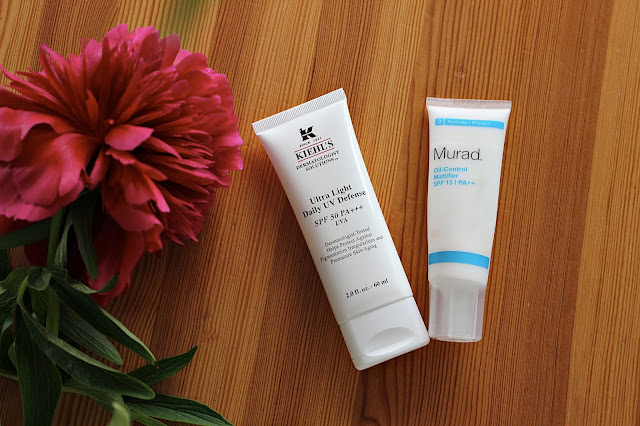Now that summer is just around the corner I thought it would be appropriate to touch on an essential subject; sun protection. The very fact that most people only reach for a sunscreen during the summer months is a first issue. I'll admit the whole science behind sun protection factors and ultra violets can be a bit confusing, but I'll try my best to give you a quick recap of what you really need to know and hopefully make it clear once and for all that we all need protection from the sun, all year round.
There are two types of damaging rays; UVA and UVB. There are both radiations from the sun that can damage your skin to different levels. Long story short, UVA rays are associated with the aging factor as these are the rays that are responsible for, you guessed it, aging and wrinkling your skin. UVA are nasty because until recently they weren't talked about that much and people tend to forget they're there when in fact they're everywhere; they easily pass through the ozone layer, clouds, glass and even clothing. In other words, if you're taking a road trip this summer on a hot and beautiful sunny day thinking that you're all safe in your car, you're wrong, as it does penetrates through glass. UVB rays, more acknowledged by the mainstream public, are associated with burn; they're the ones responsible for sunburn. They're also known to contribute to skin cancer, although more and more researches seem to come to the conclusion that UVA rays do too. SPF stands for Sun Protection Factor found in our sunscreen products and gives you an idea of how long you can stay in the sun before your skin starts to burn. For example, if you take an SPF 15, you'll be able to be exposed to the sun for 15 times longer than without protection, same goes for SPF 30 and 50. The one thing to keep in mind when purchasing a sun protection, is that most do not offer protection against UVA. Sunscreens were first designed to protect against UVB rays only, as UVA rays were once thought to be harmless. You now know better, so when you go out to shop for sunscreen, look for "broad spectrum protection" which refers to the protection of the full range of UVA and UVB. Application-wise, know that you should wear a sun protection every day and that it is the last step to your skincare routine (apply it right before your make-up). Now, you do not need and SPF 50 on a daily basis, especially during the colder months when you're less likely to hang out under the sun or when your routine consists mainly of going from home to work and back - for that an SPF 15 or 20 will do just fine. Enough of the science, let's move on to what you really want to know; which one should you go for? Granted, sunscreen weren't always glamorous. Until a few years ago, most were still those thick, heavily fragranced pastes that make you look white and clogged your pores. They were a real nightmare under make-up, too. Lucky us, nowadays brands come out with genius SPFs everyday. There is one for everyone really, some are more moisturising than others, some mattifying, even light reflecting but always light. I haven't tried them all, obviously, but here are a few I'd recommend:
- If you have oily skin: Murad Oil-Control Mattifier SPF 15 this is a great one if you struggle with a shiny T-Zone. However, you should use a higher SPF for the summer months.
- If you have dry, normal to combination skin: Kiehls Ultra Light Daily UV Defense SPF 50 an awesome product, I've converted many people to that one. As its name suggests, it really is ultra light and leaves no residue whatsoever, works beautifully under make-up too. While it is light, it is also pretty moisturising so I'd say that if you have oily skin, use a mattifier on your oiliest patches and you should be good to go.
- For all skin types: Radical Skin Perfecting Screen SPF 30 on the pricier side but it is a genius product that adds a hint of tint and radiance to you skin, does a wonderful job as a primer and is even gorgeous on its own for when you're feeling the no make-up/make-up vibe.
It kills me that still to this day I meet so many people who have no clue about what SPF, UVB and UVA stand for. Actually, most people I meet on a daily basis have no idea, or do but chose to ignore that knowledge. It kills me because sun damage is something we can prevent, something we have some kind of control on. Skin cancer is no joke, it is very much real and should not be overlooked. There are thousand of other diseases we cannot prevent, heal or even explain. I'm not saying sun damage is the only factor at the origin of skin cancer, but it is one of them. And if this doesn't sound scary enough, then think about the aging factor. It's pointless to spend hundreds of quids on anti-aging treatments of all kinds if you spend your summer burning at the beach. Wearing a sun protection on a daily basis is the first move to keep those deep, nasty wrinkles at bay or at least to prevent them from appearing prematurely. Dark-spots and discolorations ain't no fun either, if you ask me. So next time you leave the house without your sun protection on thinking you're all ready for the day, think again - you're smarter than that.
xxx

